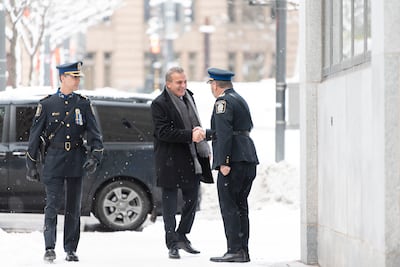A map of Lebanon hangs in Chief Fady Dagher’s office in the grey stone headquarters of Montreal's police force. It is a constant reminder of where he is from and the place he hopes to return to.
“For me, it helps me to stay connected to my roots and not to forget where I come from,” Mr Dagher said.
The 55-year-old Lebanese-Canadian officer, who moved to Canada when he was 17, is the first person from a minority background to lead Montreal police in the force's nearly 200-year history.
His appointment in January was the culmination of a lifetime of service to his adopted homeland.
“I always felt I had a debt to the Montreal community,” Mr Dagher told The National. “They welcomed me so well and it was a duty for me to serve them.”
Softly spoken with a slightly gravelly voice, Mr Dagher said that when he came to Canada in 1985 his original plan was to go to university and then return to Abidjan in the Ivory Coast, where his father ran a manufacturing company. But a chance encounter with a police officer drew him to a different life, despite strong opposition from his father.
“Oh my God, he lost it,” Mr Dagher recalled with a chuckle.
Not even an unplanned trip from his beloved father could dissuade Mr Dagher from pursuing a career in law enforcement.

“I didn’t see my father from 1985 to 1991 and he came right away to discourage me.”
While policing may not have held the same allure and status in Lebanon and Ivory Coast as it did in Canada, Mr Dagher has brought the values of both places to his role leading Montreal’s nearly 5,000 officers.
“In Lebanon and Africa, we really have the community spirit deep in us and in the police, if you don’t have the community spirit, you cannot be close to the community and you cannot find your resolve to apply the law,” he said.
Mr Dagher has championed a community approach that involves immersing officers in the neighbourhoods they patrol.
The police chief leads by example. Earlier this year, he spent five days living and sleeping at various Montreal homeless shelters to better understand the struggles faced by the city’s homeless population.
“There is no way you can lead without walking the talk,” Mr Dagher said.
At the heart of his approach to policing is a Lebanese ethos.
“I want to be able to be inside those houses, sit with them, cook with them, clean with them, eat with them and see what their stories are,” he said.
He is hoping he can help to transform a police force that is facing a severe shortage of personnel and a city grappling with a sharp rise in gun violence.
Mr Dagher estimated that the force is 20 per cent to 30 per cent short of the officers it needs. A huge part of his first few months on the job has been to go on a charm offensive trying to attract new recruits.
“That’s my first priority,” he said. “To be able to recruit and to keep the recruit is huge.”
He’s looking at immigrant communities and hoping his own career can help new Canadians see a potential future in the ranks of the Service de Police de la Ville de Montreal.
Like many cities across North America, Montreal recorded a sharp increase in violent crime during the pandemic, a trend that continued in 2022.
Mr Dagher said the force was actively looking at ways to reverse that trend and was optimistic it would.
In terms of gun violence, “last year was the worst year that we went through”, he said, but noted that since he took over in January gun violence appears to be down, a trend he hopes will continue through to the end of the year.

Mr Dagher, who signed a seven-year contract, is determined to help recharge the department, but he dreams of having one more professional act after he retires.
“I am hoping that one day I will finish my career as ambassador of Canada in Lebanon, so I can go back to where I come from,” he said.
It would be the cherry on top of an exceptional life and allow Mr Dagher to spend time closer to his ancestral village of Bikfaya in the Mount Lebanon region.
Even while he is busy leading Canada’s second-largest police force, his mind and heart are never far from the small Mediterranean country that generations of Daghers have called home.
Throughout his busy career, he said, Lebanon has always held a restorative power.
“Every time I go back to Lebanon my heart beats better, again and again. My heart is in good health when I go to Lebanon because I feel welcomed,” he said.





